|
|
|
Sort Order |
|
|
|
Items / Page
|
|
|
|
|
|
|
| Srl | Item |
| 1 |
ID:
141895
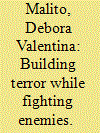

|
|
|
|
|
| Summary/Abstract |
Somalia has become a front in the US Global War on Terror (GWoT) because of the potential connection between terrorism and state fragility. While originally oriented towards ‘building states while fighting terror’, Enduring Freedom in Somalia obtained quite the opposite result of deepening the existing conflict. Why and how did the GWoT result in the controversial outcome of ‘building terror while fighting enemies’? This article argues that the GWoT sponsored in Somalia an isolationist strategy that encouraged the political polarisation and military radicalisation of the insurgency. To explore this argument, the article first analyses the structure of the intervention by focusing on the interests and strategies of the interveners. Then it evaluates the conditions under which the modality of intervention (through the use of diplomatic, economic and coercive measures) violated the conditions essential to resolving conflict.
|
|
|
|
|
|
|
|
|
|
|
|
|
|
|
|
| 2 |
ID:
141898
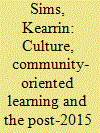

|
|
|
|
|
| Summary/Abstract |
This article critically interrogates current policy-sector approaches to culturally sensitive development and the manner in which culture has been conceptualised within the post-2015 development agenda-setting process. By providing a brief interpretive summary of academic debates surrounding culture and development, an analysis of how ‘culturally sensitive’ practices have been pursued within the policy sector, and an examination of the insufficient consideration given to culturally sensitive development within post-2015 agenda setting, I argue that much uncertainty remains around how to translate complex academic understandings of culture and development into policy responses. Following this, I provide one case study drawn from the small, low-income country of Laos to suggest possibilities as to how culturally sensitive development may be better conceptualised and implemented within a post-2015 global development era.
|
|
|
|
|
|
|
|
|
|
|
|
|
|
|
|
| 3 |
ID:
141891
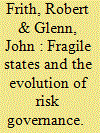

|
|
|
|
|
| Summary/Abstract |
Following the plane crashes into the twin towers of the World Trade Centre, Ulrich Beck claimed that the West would need to pursue ‘border-transcending new beginnings’ towards a more cosmopolitan world. Rather than any radical transformation along cosmopolitan lines, however, this paper maps a process of incremental reform and policy bricolage, where the post-cold war politics of intervention, and the securitisation of development, have been extended to encompass international terrorism in three overlapping phases. Although these overlapping phases – intervention, prevention and extension – are reflexive moments, they constitute a strengthening of the prevailing rationalities and technologies of risk rather than a radical rupture.
|
|
|
|
|
|
|
|
|
|
|
|
|
|
|
|
| 4 |
ID:
141893


|
|
|
|
|
| Summary/Abstract |
The EU has loudly voiced its intention to facilitate poverty reduction and democratisation in North Africa. In particular, it seeks to conclude Deep and Comprehensive Free Trade Agreements (DCFTAs) with Tunisia, Morocco and Egypt. These are seen as a vital response to the Arab Spring – integrating North African countries into the globalised economy. Applying a moral economy perspective, this article argues, however, that, while ‘Normative Power Europe’ seeks to build more tranquil societies in the region, its trade policies nevertheless threaten to exacerbate poverty and social unrest. The prospect of de-industrialisation in the wake of FTAs will do much to entrench economic asymmetries between the European metropole and its neighbours.
|
|
|
|
|
|
|
|
|
|
|
|
|
|
|
|
| 5 |
ID:
141896


|
|
|
|
|
| Summary/Abstract |
Scholarly attempts to explain aid subversion in post-conflict contexts frame the challenge in terms of corrupt practices and transactions disconnected from local power struggles. Also, they assume a distinction between organised crime and the state. This comparative analysis of aid subversion in Colombia and Afghanistan reveals the limits of such an approach. Focusing on relations that anchor organised crime within local political, social and economic processes, we demonstrate that organised crime is dynamic, driven by multiple motives and endogenous to local power politics. Better understanding of governance arrangements around the organised crime–conflict nexus which enables aid subversion is therefore required.
|
|
|
|
|
|
|
|
|
|
|
|
|
|
|
|
| 6 |
ID:
141892
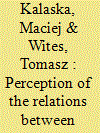

|
|
|
|
|
| Summary/Abstract |
People register and process stimuli every day, creating an image of space–time reality involving multifaceted relations between various states. The authors have created a database consisting of articles from the periodical Le Monde diplomatique from 1954 to 2009. This paper focuses on investigating how strong relations are between former colonial powers and developing countries. The authors present an index showing the frequency of coincidence of opinion-shaping content in articles about one of the selected world powers and a developing country; they next establish a quantitative reference to dependency and world-systems theories.
|
|
|
|
|
|
|
|
|
|
|
|
|
|
|
|
| 7 |
ID:
141897
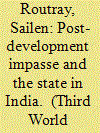

|
|
|
|
|
| Summary/Abstract |
After discussing the various points of departure suggested by scholars of development, this paper argues that, in the context of India, one way out of the post-development impasse lies in shifting the focus from development politics to the workings of the developmental state on the ground, and to change the methodological vantage point to ethnography. It is suggested that this change in approach would provide fresh insights into the workings of the developmental state and into the process of development in India.
|
|
|
|
|
|
|
|
|
|
|
|
|
|
|
|
| 8 |
ID:
141894


|
|
|
|
|
| Summary/Abstract |
This article investigates the regional dynamics of African agency in the case of negotiations on an Economic Partnership Agreement (EPA) between the EU and a group of Southern African countries, known as SADC-Minus. I argue that these negotiations were shaped by a pattern of differentiated responses to the choice set on offer under the EPAs by SADC-Minus policy makers and by a series of strategic interactions and power plays between them. I offer two contributions to an emerging literature on the role of African agency in international politics. First, I argue for a clear separation between ontological claims about the structure–agency relationship and empirical questions about the preferences, strategies and influence of African actors. Second, I suggest that, in order to understand the regional dynamics of African agency, it is important to pay close attention to the diversity and contingency of African preferences and to the role of both power politics and rhetorical contestation in regional political processes.
|
|
|
|
|
|
|
|
|
|
|
|
|
|
|
|
| 9 |
ID:
141900
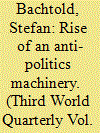

|
|
|
|
|
| Summary/Abstract |
Results’, ‘value for money’, ‘effectiveness’ and similar buzzwords have become commonplace in development cooperation and peace building. The use of technical instruments such as project cycle management and evaluations is hardly questioned anymore: these are presented as a minor shift of focus to make current practice more effective. This paper argues that there is far more to this shift: a machinery of practices and institutions has been installed that removes political questions on development or peace from the political realm and places them under the rule of technical experts. Drawing on a Foucauldian understanding of discourse analysis, the paper analyses how this machinery prioritises gradual reform, subjugates other approaches to societal change and reproduces power/knowledge networks in both the global South and North. Based on ethnographic field research in Myanmar, it also explores discursive strategies of local actors and assesses how they are aiming to create spaces to challenge this machinery.
|
|
|
|
|
|
|
|
|
|
|
|
|
|
|
|
| 10 |
ID:
141899
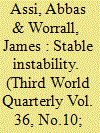

|
|
|
|
|
| Summary/Abstract |
Given the morass of the Syrian civil war and Lebanon’s exposure to the consequences, this article seeks to explore how the intersecting dynamics of Lebanese domestic conflicts and the multiple implications of the bloodbath in Syria have influenced the behaviour of Lebanese political parties in their ongoing struggle over the formulation of a new electoral law, leading to a broad consensus among the country’s parties to postpone the 2013 parliamentary elections. The article argues that, while the usual attempts to profit at the expense of other groups in society are still present and external patrons still wield great influence, the decision to postpone the elections also demonstrates a degree of pragmatism and political development since, despite dire predictions to the contrary, Lebanon has not succumbed to the return of its own civil war. Instead a complex mixture of pragmatism, elision of interests and external influence, combined with local agency, has led Lebanon into a situation of stable instability.
|
|
|
|
|
|
|
|
|
|
|
|
|
|
|
|
|
|
|
|
|